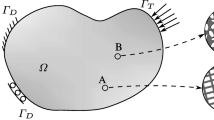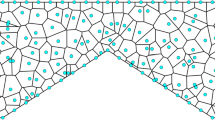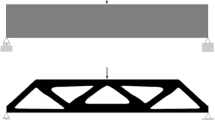Abstract
This paper puts forward two new methods for reliability-based design optimization (RBDO) of complex engineering systems. The methods involve an adaptive-sparse polynomial dimensional decomposition (AS-PDD) of a high-dimensional stochastic response for reliability analysis, a novel integration of AS-PDD and score functions for calculating the sensitivities of the failure probability with respect to design variables, and standard gradient-based optimization algorithms, encompassing a multi-point, single-step design process. The two methods, depending on how the failure probability and its design sensitivities are evaluated, exploit two distinct combinations built on AS-PDD: the AS-PDD-SPA method, entailing the saddlepoint approximation (SPA) and score functions; and the AS-PDD-MCS method, utilizing the embedded Monte Carlo simulation (MCS) of the AS-PDD approximation and score functions. In both methods, the failure probability and its design sensitivities are determined concurrently from a single stochastic simulation or analysis. When applied in collaboration with the multi-point, single-step framework, the proposed methods afford the ability of solving industrial-scale design problems. Numerical results stemming from mathematical functions or elementary engineering problems indicate that the new methods provide more computationally efficient design solutions than existing methods. Furthermore, shape design of a 79-dimensional jet engine bracket was performed, demonstrating the power of the AS-PDD-MCS method developed to tackle practical RBDO problems.











Similar content being viewed by others
References
Agarwal H, Renaud J E (2006) New decoupled framework for reliability-based design optimization. AIAA J 44:1524–1531
Browder A (1996) Mathematical analysis: an introduction. Undergraduate texts in mathematics. Springer Verlag
Chiralaksanakul A, Mahadevan S (2005) First-order approximation methods in reliability-based design optimization. J Mech Des 127(5):851–857
Daniels H E (1954) Saddlepoint approximations in statistics. Ann Math Stat:631–650
DOT (2001) DOT – design optimization tools, user’s manual. Vanderplaats Research and Development Inc., Colorado Springs, CO
Du X P, Chen W (2004) Sequential optimization and reliability assessment method for efficient probabilistic design. J Mech Des 126(2):225–233
Efron B, Stein C (1981) The jackknife estimate of variance. Ann Stat 9(3):586–596
Gautschi W (2004) Orthogonal polynomials: computation and approximation. Numerical mathematics and scientific computation. Oxford University Press
Genz A (1986) Fully symmetric interpolatory rules for multiple integrals. SIAM J Numer Anal 23(6):1273–1283
Genz A, Keister B D (1996) Fully symmetric interpolatory rules for multiple integrals over infinite regions with Gaussian weight. J Comput Appl Math 71(2):299–309
Golinski J (1970) Optimal synthesis problems solved by means of nonlinear programming and random methods. J Mech 5(3):287–309
Hu C, Youn B D (2011) Adaptive-sparse polynomial chaos expansion for reliability analysis and design of complex engineering systems. Struct Multidiscip Optim 43(3):419–442
Kuschel N, Rackwitz R (1997) Two basic problems in reliability-based structural optimization. Math Methods Oper Res 46:309–333
Lee J J, Lee B C (2005) Efficient evaluation of probabilistic constraints using an envelope function. Eng Optim 37(2):185–200
Lee I, Choi K K, Du L, Gorsich D (2008a) Dimension reduction method for reliability-based robust design optimization. Comput Struct 86(13):1550–1562
Lee I, Choi K, Du L, Gorsich D (2008b) Inverse analysis method using MPP-based dimension reduction for reliability-based design optimization of nonlinear and multi-dimensional systems. Comput Methods Appl Mech Eng 198(1):14–27
Lee G, Yook S, Kang K, Choi D H (2012) Reliability-based design optimization using an enhanced dimension reduction method with variable sampling points. Int J Precis Eng Manuf 13(9):1609– 1618
Liang J H, Mourelatos Z P, Nikolaidis E (2007) A single-loop approach for system reliability-based design optimization. J Mech Des 129(12):1215–1224
Lugannani R, Rice S (1980) Saddle point approximation for the distribution of the sum of independent random variables. Adv Appl Probab 12:475–490
Rahman S (2008) A polynomial dimensional decomposition for stochastic computing. Int J Numer Methods Eng 76:2091–2116
Rahman S, Wei D (2008) Design sensitivity and reliability-based structural optimization by univariate decomposition. Struct Multidiscip Optim 35(3):245–261
Rahman S (2009a) Extended polynomial dimensional decomposition for arbitrary probability distributions. J Eng Mech 135(12):1439–1451
Rahman S (2009b) Stochastic sensitivity analysis by dimensional decomposition and score functions. Probab Eng Mech 24(3):278–287
Rahman S (2011) Decomposition methods for structural reliability analysis revisited. Probab Eng Mech 26 (2):357–363
Rahman S, Yadav V (2011) Orthogonal polynomial expansions for solving random eigenvalue problems. Int J Uncert Quant 1(2):163–187
Rahman S (2014) Approximation errors in truncated dimensional decompositions. Math Comput 83 (290):2799–2819
Rahman S, Ren X C (2014) Novel computational methods for high-dimensional stochastic sensitivity analysis. Int J Numerl Methods Eng 98:881–916
Ren X C, Rahman S (2013) Robust design optimization by polynomial dimensional decomposition. Struct Multidiscip Optim 48(1):127–148
Royset J O, Der Kiureghian A, Polak E (2001) Reliability-based optimal structural design by the decoupling approach. Reliab Eng Syst Safety 73(3):213–221
Rubinstein R Y, Shapiro A (1993) Discrete event systems: sensitivity analysis and stochastic optimization by the score function method. Wiley series in probability and mathematical statistics, Wiley
Stephens R, Fuchs H (2001) Metal fatigue in engineering. Wiley-Interscience
Toropov V V, Filatov A A, Polynkin A A (1993) Multiparameter structural optimization using FEM and multipoint explicit approximations. Struct Multidiscip Optim 6(1):7–14
Tu J, Choi K K, Park Y H (1999) A new study on reliability-based design optimization. J Mech Des Trans ASME 121(4):557–564
Xu H, Rahman S (2004) A generalized dimension-reduction method for multidimensional integration in stochastic mechanics. Int J Numer Methods Eng 61(12):1992–2019
Yadav V, Rahman S (2013) Uncertainty quantification of high-dimensional complex systems by multiplicative polynomial dimensional decompositions. Int J Numer Methods Eng 94(3):221–247
Yadav V, Rahman S (2014a) A hybrid polynomial dimensional decomposition for uncertainty quantification of high-dimensional complex systems. Probab Eng Mech 38:22–34
Yadav V, Rahman S (2014b) Adaptive-sparse polynomial dimensional decomposition for high-dimensional stochastic computing. Comput Methods Appl Mech Eng 274:56–83
Youn B, Wang P (2008) Bayesian reliability-based design optimization using eigenvector dimension reduction (EDR) method. Struct Multidiscip Optim 36(2):107–123
Yuen K V, Wang J, Au S K (2007) Application of saddlepoint approximation in reliability analysis of dynamic systems. Earthq Eng Eng Vibr 6(4):391–400
Zou T, Mahadevan S (2006) A direct decoupling approach for efficient reliability-based design optimization. Struct Multidiscip Optimn 31(3):190–200
Acknowledgments
The authors acknowledge financial support from the U.S. National Science Foundation under Grant No. CMMI-0969044.
Author information
Authors and Affiliations
Corresponding author
Rights and permissions
About this article
Cite this article
Ren, X., Yadav, V. & Rahman, S. Reliability-based design optimization by adaptive-sparse polynomial dimensional decomposition. Struct Multidisc Optim 53, 425–452 (2016). https://doi.org/10.1007/s00158-015-1337-6
Received:
Revised:
Accepted:
Published:
Issue Date:
DOI: https://doi.org/10.1007/s00158-015-1337-6




